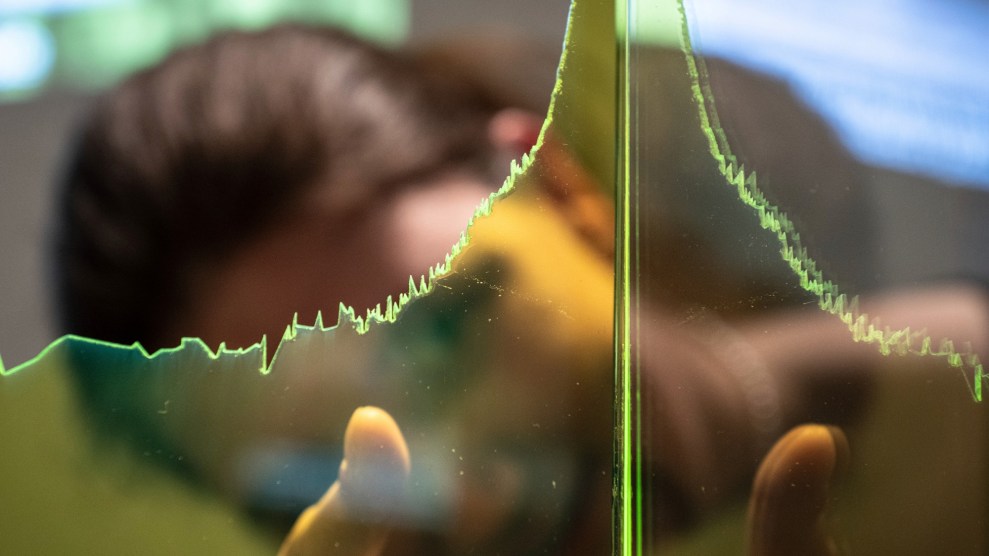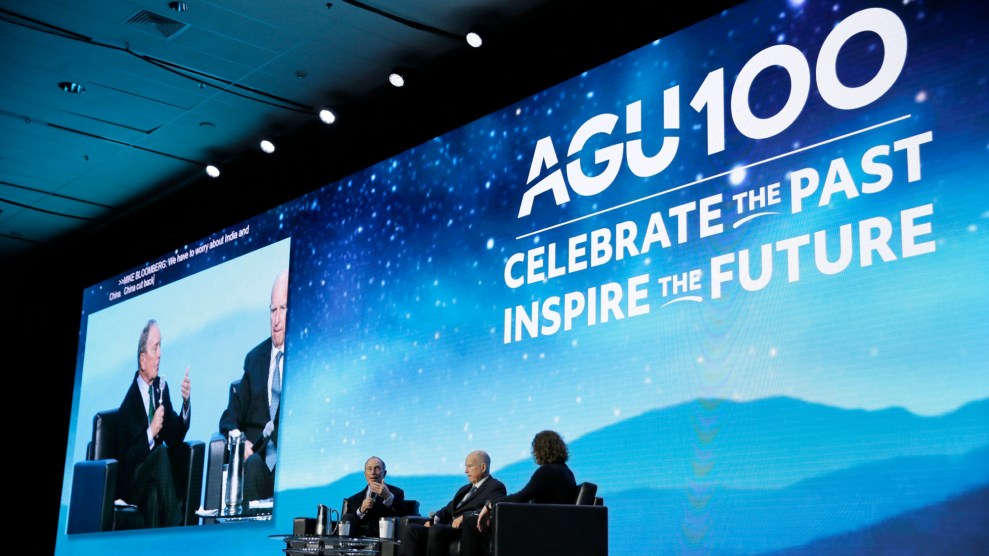
An artistic depiction of the Keeling Curve, which shows atmospheric CO2 concentrations over time.Swen Pförtner/AP
This story was originally published by the Guardian and is reproduced here as part of the Climate Desk collaboration.
The fossil fuel industry funded some of the world’s most foundational climate science as early as 1954, newly unearthed documents have shown, including the early research of Charles Keeling, famous for the so-called ‘Keeling curve’ that has charted the upward march of the Earth’s carbon dioxide levels.
A coalition of oil and car manufacturing interests provided $13,814 (about $158,000 in today’s money) in December 1954 to fund Keeling’s earliest work in measuring CO2 levels across the western US, the documents reveal.
Keeling would go on to establish the continuous measurement of global CO2 at the Mauna Loa Observatory in Hawaii. This ‘Keeling curve’ has tracked the steady increase of the atmospheric carbon that drives the climate crisis and has been hailed as one of the most important scientific works of modern times.
The fossil fuel interests backed a group, known as the Air Pollution Foundation, that issued funding to Keeling to measure CO2 alongside a related effort to research the smog that regularly blighted Los Angeles at the time. This is earlier than any previously known climate research funded by oil companies.
In the research proposal for the money—uncovered by Rebecca John, a researcher at the Climate Investigations Center, and published by the climate website DeSmog—Keeling’s research director, Samuel Epstein, wrote about a new carbon isotope analysis that could identify “changes in the atmosphere” caused by the burning of coal and petroleum.
“The possible consequences of a changing concentration of the CO2 in the atmosphere with reference to climate, rates of photosynthesis, and rates of equilibration with carbonate of the oceans may ultimately prove of considerable significance to civilization,” Epstein, a researcher at the California Institute of Technology (or Caltech), wrote to the group in November 1954.
Experts say the documents show the fossil fuel industry had intimate involvement in the inception of modern climate science, along with its warnings of the severe harm climate change will wreak, only to then publicly deny this science for decades and fund ongoing efforts to delay action on the climate crisis.
“They contain smoking gun proof that by at least 1954, the fossil fuel industry was on notice about the potential for its products to disrupt Earth’s climate on a scale significant to human civilization,” said Geoffrey Supran, an expert in historic climate disinformation at the University of Miami.
“These findings are a startling confirmation that Big Oil has had its finger on the pulse of academic climate science for 70 years—for twice my lifetime—and a reminder that it continues to do so to this day. They make a mockery of the oil industry’s denial of basic climate science decades later.”
Previous investigations of public and private records have found that major oil companies spent decades conducting their own research into the consequences of burning their product, often to an uncannily accurate degree—a study last year found that ExxonMobil scientists made “breathtakingly” accurate predictions of global heating in the 1970s and 1980s.
The newly discovered documents now show the industry knew of CO2’s potential climate impact as early as 1954 via, strikingly, the work of Keeling, then a 26-year-old Caltech researcher conducting formative work measuring CO2 levels across California and the waters of the Pacific ocean. There is no suggestion that oil and gas funding distorted his research in any way.
The findings of this work would lead the US scientist to further experiments upon the Mauna Loa volcano in Hawaii that were to provide a continual status report of the world’s dangerously-rising carbon dioxide composition.
Keeling died in 2005 but his seminal work lives on. Currently, the Earth’s atmospheric CO2 level is 422 parts per million, which is nearly a third higher than the first reading taken in 1958, and a 50 percent jump on pre-industrial levels.
This essential tracking of the primary heat-trapping gas that has pushed global temperatures to higher than ever previously experienced in human civilization was born, in part, due to the backing of the Air Pollution Foundation.
A total of 18 automotive companies, including Ford, Chrysler, and General Motors, gave money to the foundation. Other entities, including banks and retailers, also contributed funding.
Separately, a 1959 memo identifies the American Petroleum Institute (API), the US’s leading oil and gas lobbying body, and the Western Oil and Gas Association, now known as the Western States Petroleum Association, as “major contributors to the funds of the Air Pollution Foundation.” It’s not clear exactly when API started funding the foundation but it had a representative on a research committee from mid-1955 onwards.
A policy statement of the Air Pollution Foundation from 1955 calls the problem of air pollution, which is caused by the emissions of cars, trucks and industrial facilities, “one of the most serious confronting urban areas in California and elsewhere” and that the issue will be addressed via “diligent and honest fact finding, by wise and effective action.”
The unearthed documents come from the Caltech archives, the US National Archives, the University of California at San Diego and Los Angeles newspapers from the 1950s, and represent what may be the first instance of the fossil fuel industry being informed of the potentially dire consequences of its business model.
The oil and gas industry was initially concerned with research related to smog and other direct air pollutants before branching out into related climate change impacts, according to Carroll Muffett, chief executive of the Center for International Environmental Law.
“You just come back to the oil and gas industry again and again, they were omnipresent in this space,” he said. “The industry was not just on notice but deeply aware of the potential climate implications of its products for going on 70 years.”
Muffett said the documents add further impetus to efforts in various jurisdictions to hold oil and gas firms legally liable for the damages caused by the climate crisis.
“These documents talk about CO2 emissions having planetary implications, meaning this industry understood extraordinarily early on that fossil fuel combustion was profound on a planetary scale,” he said. “There is overwhelming evidence the oil and gas industry has been misleading the public and regulators around the climate risks of their product for 70 years. Trusting them to be part of the solutions is foolhardy. We’ve now moved into an era of accountability.”
API and Ralph Keeling, Charles’s son who is also a scientist, were contacted for comment about the documents but did not respond.
The fossil fuel interests backed a group, known as the Air Pollution Foundation, that issued funding to Keeling to measure CO2 alongside a related effort to research the smog that regularly blighted Los Angeles at the time. This is earlier than any previously known climate research funded by oil companies.
In the research proposal for the money—uncovered by Rebecca John, a researcher at the Climate Investigations Center, and published by the climate website DeSmog—Keeling’s research director, Samuel Epstein, wrote about a new carbon isotope analysis that could identify “changes in the atmosphere” caused by the burning of coal and petroleum.
“The possible consequences of a changing concentration of the CO2 in the atmosphere with reference to climate, rates of photosynthesis, and rates of equilibration with carbonate of the oceans may ultimately prove of considerable significance to civilization,” Epstein, a researcher at the California Institute of Technology (or Caltech), wrote to the group in November 1954.
Experts say the documents show the fossil fuel industry had intimate involvement in the inception of modern climate science, along with its warnings of the severe harm climate change will wreak, only to then publicly deny this science for decades and fund ongoing efforts to delay action on the climate crisis.
“They contain smoking gun proof that by at least 1954, the fossil fuel industry was on notice about the potential for its products to disrupt Earth’s climate on a scale significant to human civilization,” said Geoffrey Supran, an expert in historic climate disinformation at the University of Miami.
“These findings are a startling confirmation that big oil has had its finger on the pulse of academic climate science for 70 years—for twice my lifetime—and a reminder that it continues to do so to this day. They make a mockery of the oil industry’s denial of basic climate science decades later.”
Previous investigations of public and private records have found that major oil companies spent decades conducting their own research into the consequences of burning their product, often to an uncannily accurate degree – a study last year found that Exxon scientists made “breathtakingly” accurate predictions of global heating in the 1970s and 1980s.
The newly discovered documents now show the industry knew of CO2’s potential climate impact as early as 1954 via, strikingly, the work of Keeling, then a 26-year-old Caltech researcher conducting formative work measuring CO2 levels across California and the waters of the Pacific ocean. There is no suggestion that oil and gas funding distorted his research in any way.
The findings of this work would lead the US scientist to further experiments upon the Mauna Loa volcano in Hawaii that were to provide a continual status report of the world’s dangerously-rising carbon dioxide composition.
Keeling died in 2005 but his seminal work lives on. Currently, the Earth’s atmospheric CO2 level is 422 parts per million, which is nearly a third higher than the first reading taken in 1958, and a 50 percent jump on pre-industrial levels.
This essential tracking of the primary heat-trapping gas that has pushed global temperatures to higher than ever previously experienced in human civilization was born, in part, due to the backing of the Air Pollution Foundation.
A total of 18 automotive companies, including Ford, Chrysler and General Motors, gave money to the foundation. Other entities, including banks and retailers, also contributed funding.
Separately, a 1959 memo identifies the American Petroleum Institute, the US’s leading oil and gas lobbying body, and the Western Oil and Gas Association, now known as the Western States Petroleum Association, as “major contributors to the funds of the Air Pollution Foundation.” It’s not clear exactly when API started funding the foundation but it had a representative on a research committee from mid-1955 onwards.
A policy statement of the Air Pollution Foundation from 1955 calls the problem of air pollution, which is caused by the emissions of cars, trucks and industrial facilities, “one of the most serious confronting urban areas in California and elsewhere” and that the issue will be addressed via “diligent and honest fact finding, by wise and effective action.”
The unearthed documents come from the Caltech archives, the US National Archives, the University of California-San Diego and Los Angeles newspapers from the 1950s, and represent what may be the first instance of the fossil fuel industry being informed of the potentially dire consequences of its business model.
The oil and gas industry was initially concerned with research related to smog and other direct air pollutants before branching out into related climate change impacts, according to Carroll Muffett, chief executive of the Center for International Environmental Law.
“You just come back to the oil and gas industry again and again, they were omnipresent in this space,” he said. “The industry was not just on notice but deeply aware of the potential climate implications of its products for going on 70 years.”
Muffett said the documents add further impetus to efforts in various jurisdictions to hold oil and gas firms legally liable for the damages caused by the climate crisis.
“These documents talk about CO2 emissions having planetary implications, meaning this industry understood extraordinarily early on that fossil fuel combustion was profound on a planetary scale,” he said. “There is overwhelming evidence the oil and gas industry has been misleading the public and regulators around the climate risks of their product for 70 years. Trusting them to be part of the solutions is foolhardy. We’ve now moved into an era of accountability.”
API and Ralph Keeling, Charles’s son who is also a scientist, were contacted for comment about the documents but did not respond.















